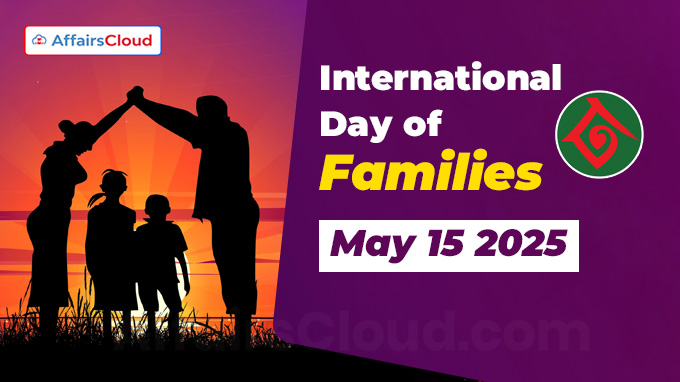 The United Nations (UN’s) International Day of Families (IDF) is observed annually across the globe on May 15 to highlight the role of families in societal development and aims to address the various social, economic, and demographic challenges impacting them globally.
The United Nations (UN’s) International Day of Families (IDF) is observed annually across the globe on May 15 to highlight the role of families in societal development and aims to address the various social, economic, and demographic challenges impacting them globally.
- 2025 marks the 31st anniversary of the International Year of the Family (IYF), observed in 1994.
Symbol:
The International Day of Families is represented by a symbol featuring a solid green circle encompassing a red image of a heart beneath a roof, symbolizing the home.
2025 Theme:
The theme for IDF 2025 is “Family-Oriented Policies for Sustainable Development: Towards the Second World Summit for Social Development.”
- It highlights the need to include family-focused policies in national plans to address global issues like climate change, urban growth, technology changes, and population shifts.
Background:
i.In 1989, the UN General Assembly (UNGA) proclaimed 1994 as the International Year of the Family via Resolution 44/82.
ii.In 1993, the UNGA adopted Resolution A/RES/47/237, designating May 15 as the annual International Day of Families.
- The International Day of Families is observed annually under the guidance of the United Nations Department of Economic and Social Affairs (UN DESA), with its Division for Inclusive Social Development (DISD) taking the lead in coordinating and organizing the global observance.
iii.The 1st International Day of Families was observed on May 15, 1994.
Objectives of IDF 2025:
The 2025 IDF observance aims to:
i.Highlight the importance of family policy focus in the upcoming Second World Summit for Social Development.
ii.Present an analysis of family policies and issues in National Voluntary Reviews (VNRs) 2020–2024.
iii.Review major initiatives undertaken as part of the preparations for and observance of the 30th anniversary of the International Year of the Family (IYF+30).
iv.Showcase good practices in family policymaking at regional and national levels.
v.Recommend family-oriented policies for the implementation of the 2030 Agenda for Sustainable Development.
Second World Summit for Social Development:
The Second World Summit for Social Development is scheduled to take place in Doha, Qatar, from November 4 to 6, 2025.
- This summit aims to address persistent gaps in social development, recommit to the goals outlined in the 1995 Copenhagen Declaration and Programme of Action, and accelerate progress towards the 2030 Agenda for Sustainable Development.
Research Paper on Family Policies (2020–2024):
A key highlight of IDF 2025 is the launch of a research paper analyzing Family-oriented Priorities, Policies and Programmes in the Implementation of the 2030 Agenda for Sustainable Development as reported in VNRs of 2020 to 2024. The paper will:
- Evaluate how family policies contribute to Sustainable Development Goal (SDG) targets.
- Identify gaps in policy implementation.
- Provide data-driven recommendations for resilient family systems.
Global Relevance of Family Policies:
Families are central to achieving SDGs due to their role in:
i.Education: 80% of family farms in developing countries rely on intergenerational knowledge transfer.
ii.Climate Resilience: Low-income families face heightened climate risks, contributing to 68% of women and 57% of men with mental health challenges being parents.
iii.Economic Stability: During crises like COVID-19, 1 in 4 families with children experienced food insecurity.
About United Nations Department of Economic and Social Affairs (UN DESA):
Under-Secretary-General – Li Junhua
Headquarters – New York, the United States of America(USA)
Founded – 1948




